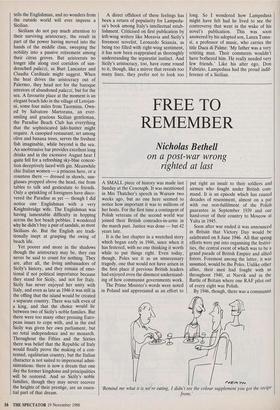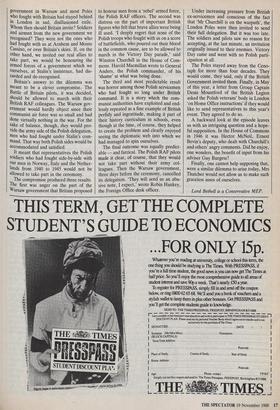FREE TO REMEMBER
Nicholas Bethell on a post-war wrong righted at last
A SMALL piece of history was made last Sunday at the Cenotaph. It was mentioned in Mrs Thatcher's speech in Warsaw two weeks ago, but no one here seemed to notice how important it was to millions of her hosts. For the first time a contingent of Polish veterans of the second world war joined their British comrades-in-arms in the march past. Justice was done — but 42 years late.
It is the last chapter in a wretched story which began early in 1946, since when it has festered, with no one thinking it worth while to put things right. Even today, though, Poles see it as an unnecessary tragedy, one that would not have arisen in the first place if previous British leaders had enjoyed even the dimmest understand- ing of how communist governments work.
The Prime Minister's words were noted in Poland and appreciated as an effort to put right an insult to their soldiers and airmen who fought under British com- mand. It is an episode which has caused decades of resentment, almost on a par with our non-fulfilment of the Polish guarantee in September 1939 and our hand-over of their country to Moscow at Yalta in 1945.
Soon after war ended it was announced in Britain that Victory Day would be celebrated on 8 June 1946. All that spring efforts were put into organising the festivi- ties, the central event of which was to be a grand parade of British Empire and allied forces. Foremost among the latter, it was assumed, would be the Poles. Unlike other allies, their meri had fought with us throughout 1940, at Narvik and in the Battle of Britain where one RAF pilot out of every eight was Polish.
By 1946, though, there was a communist 'Remind me what it is we're eating, I didn't see the colour supplement you got the recipe from.' government in Warsaw and most Poles who fought with Britain had stayed behind in London in sad, disillusioned exile. Whom then should Britain invite? Soldiers and airmen from the new government we recognised? They were not the ones who had fought with us at Arnhem and Monte Cassino, or over Britain's skies. If, on the other hand, we invited our real allies to take part, we would be honouring the armed forces of a government which we ourselves, at Stalin's insistence, had dis- carded and de-recognised.
Britain's answer to the dilemma was meant to be a clever compromise. The Battle of Britain pilots, it was decided, should be allowed to march with their British RAF colleagues. The Warsaw gov- ernment would hardly object since their communist air force was so small and had done virtually nothing in the war. For the sake of balance, though, they would pro- vide the army side of the Polish delegation, men who had fought under Stalin's com- mand. That way both Polish sides would be accommodated and satisfied.
It meant that representatives the Polish soldiers who had fought side-by-side with our men in Norway, Italy and the Nether- lands from 1940 to 1945 would not be allowed to take part in the ceremony.
The compromise produced three results. The first was anger on the part of the Warsaw government that Britain proposed to honour men from a 'rebel' armed force, the Polish RAF officers. The second was distress on the part of important British figures who felt that brave allies were being ill used. 'I deeply regret that none of the Polish troops who fought with us on a score of battlefields, who poured out their blood in the common cause, are to be allowed to march in the Victory Day parade,' said Winston Churchill in the House of Com- mons. Harold Macmillan wrote to General Anders, the Polish commander, of his 'shame' at what was being done.
The third and most predictable result was horror among those Polish servicemen who had fought so long under British command. It is a story which the com- munist authorities have exploited and end- lessly repeated as a fine example of British perfidy and ingratitude, making it part of their history curriculum in schools, even though at the time, of course, they helped to create the problem and clearly enjoyed seeing the diplomatic web into which we had managed to spin ourselves.
The final outcome was equally predict- able — and farcical. The Polish RAF pilots made it clear, of course, that they would not take part without their army col- leagues. Then the Warsaw government, three days before the ceremony, cancelled its delegation. 'They will send us an abu- sive note, I expect,' wrote Robin Hankey, the Foreign Office desk officer. Under increasing pressure from British ex-servicemen and conscious of the fact that 'Mr Churchill is on the warpath', the London Poles were then invited to send their full delegation. But it was too late. The soldiers and pilots saw no reason for accepting, at the last minute, an invitation originally issued to their enemies. Victory Day came and went with no Polish parti- cipation at all.
The Poles stayed away from the Ceno- taph for more than four decades. They would come, they said, only if the British Government invited them. Finally, in May of this year, a letter from Group Captain Denis Mountford of the British Legion asked the Polish veterans' body in London 'on Home Office instructions' if they would like to send representatives to this year's event. They agreed to do so.
A backward look at the episode leaves us with an intriguing question and a hope- ful supposition. In the House of Commons in 1946 it was Hector McNeil, Ernest Bevin's deputy, who dealt with Churchill's and others' angry comments. Did he enjoy, one wonders, the benefit of input from his adviser Guy Burgess?
Finally, one cannot help supposing that, were a similar dilemma to arise today, Mrs Thatcher would not allow us to make such graceless asses of ourselves.
Lord Bethel! is a Conservative MEP.























































 Previous page
Previous page